#economy
Text
#curvy body#economy#jenna lynn meowri#bunnies#jack skellington#caps#70s fashion#bieber#scoups#shelley hennig#gus porter#jshk
128 notes
·
View notes
Text

SAFETY AS ILLUSION- DANGER AS FRACTURE
1. Connected to the maintenance of life as living death is the second promise of the walls of civilization, the promise of safety.
2. Safety is always illusionary, as the countless attentats, and ever changing airport security protocols reveal- yet its impositions are very solid. Take the traditional wall around a town or settlement (which offers the promise of 'protection from the outside threat- the barbarian); the wall can be undermined, scaled, even broken to pieces if one has time and motivation, it crumbles with age and without constant maintenance and can be bypassed simply by seducing the one who guards it. Yet, to the individual inside the wall, the towering mass of bricks seems both impenetrable and inescapable, and represents a very material disconnect from that which is outside (one cannot for example even see what is outside the walls).
3. Thus the illusion of safety, is stripped bare, not as a form of protection, but as a form of containment; only those who live inside the walls can be convinced of safeties impenetrability- anyone with will enough to exist beyond the walls can see the paper tiger for what it really is- a trap to prevent escape and not a defense against entry.
4. Todays walls are much more diffuse; produced on and in the psychic level in the schools and social relations, the walls are built up inside the minds of individuals who for so many generations have lived inside of them and now no longer need not to see the outside in order to be afraid of it.
5. The illusion of safety has permeated every aspect of daily life, what 'safety' means is never concretely defined; aside from the columns of foot-soldiers patrolling the streets and CCTV at every corner, there is no discursive definition of what it might mean to be 'safe' and no concrete description of what the danger really is.
6. Even radical milieus have adopted these logics, with demands for 'safe space', policies defining safety, and the imagining that one can create places or communities free from the 'dangers' of the outside world.
7. Safety is always premised in imaginary dangers- usually the dangers of the outside, the 'other', or most often mortality. In the name of being kept alive any number of repressive measures become normalized.
8. To assist or allow suicide is still illegal in most of the world[4], the cages of the mental hospitals and prisons are filled with individuals who present a 'danger' to the life of themselves or others.
9. The demand for safety, always walks hand in hand with the forces of domination. Be that tradition of Radical Feminism which demanded 'safer streets' for women against masked and racialized attackers (and resulted in huge police incursions into poor and racialized communities), or the push by LGBT charities for hate crime legislation to protect individuals from street harassment/harm (and which has been used as a 'catchall legislation' that sees vast increases in incarceration and penal punishments for as little as saying 'fuck' in a public space).[5]
10. A fitting example of the anthropocentric obsession with safety is the 'house cat'; a being for whom the entirety of its existence is passed within the confined walls of an apartment. Premised on the idea that the dangers of the outside world; getting lost, starving to death, being run over by a car- are so terrifying (from the human captors point of view) as to justify the ultimate cruelty and curtailment of freedom. The cat is kept entirely 'safe', in a sterile environment which cannot harm her; and yet can one say honestly that a being for whom long nights, restless hunts, a shrugging disregard for humanity are normal character traits- the four walls of a human made prison will bring her happiness?
11. The 'house cat' also serves as fitting analogy for our own lives- the masters of domination keep us safely contained in the cities, the workplace, the homes; and we may wriggle a little, excited by the promise of the gym or the swimming pool- but to go outside, truly outside of their world is not only forbidden but now impossible. We welcome the crushing wheels of the car or the neighbors dog to carry us away- danger signifies freedom.
12. Individuals oscillate between captor and captive as they internalize and reproduce the logic of safety. From the cop on the street corner, to the parent warning its children of the dangers of pedophiles, to the liberal queer askewing violent or confrontational action and enforcing passivity in the name of 'inclusivity'.
13. Individuals of this epoch must face the fact that nowhere is 'safe', and that anyone promising to provide safety is in fact only (re)producing captivity.
14. When entangled with the enforcers of safety- (the police or their representatives) one soon becomes aware, that the illusion of safety is not some absolute safety from harm, but some imagined parameter of safety defined by the apparatchiks and algorithms of domination.
15. When falling fowl of the enforces of safety, one quickly realities that their version of 'keeping you safe' in fact means keeping you under control, or more often saving you from imagined danger so that they can inflict their own very real harm upon you.
16. One can for example be stopped for driving the car too fast, for passing a red light too early, for trying to jump from a bridge, for exploring and abandoned warehouse, or for engaging in a physical confrontation, in all the examples the behavior will first been defined as 'dangerous' and the narrative usually follows "we are here to protect you". Naturally the moment one is in the hands of those enforcers of safety, she can expect to be beaten, tortured, confined in a cage, sexually assaulted, humiliated, bullied and harmed in any myriad of unnameable ways.
17. "Keeping you safe" is synonymous with maintaining the monopoly of danger, harm and violence.
18. It benefits domination to have as many imaginary dangers as possible at play in any given moment. The more, and scarier the dangers, the greater the playground for imagining ways to ensure 'safety'.
19. The ever increasing number of dangers which the civilized order is happy to integrate into its logic- be that the threat of terrorism, ecological disaster, petty crime, homophobia, gendered violence or racism justifies an ever increasing number of punishments, containments and cages.
20. In many 'liberal democracies' we see how the response to popular awareness of structural oppression has been to criminalize any individuals who are accused of perpetuating it (ignoring the reality that the state is always the biggest perpetrator). From hate crime legislation protecting 'oppressed minorities' to attempts to ban networks like tor (because thats where terrorists live) we see time and time again that the promise to keep us free from danger, warped into the very real application of harm.
21. The illusion of safety rests on a very fluid understanding or what and who represent danger. In the logic of domination, we are presented daily with the idea, that a heavily armed gang, enshrined with the right to murder, kidnap, rape, and torture (the police) are 'safe' and that some kid running a red light or walking whilst black represents danger.
22. This is further complicated by status's awarded to individuals based on presumed compliance/non compliance- the refugee is 'safe' the illegal immigrant is dangerous, the steel worker is 'safe' the sex worker is dangerous, the law abiding citizen is 'safe' the criminal is dangerous. The arbitrary awarding of the right to safety is in fact the real danger.
23. Such arbitrary awarding, mean that In the name of safety we have armed hooligans patrolling the streets with assault rifles- and one can go to jail for carrying a kitchen knife from store to homestead.
24. Anyone who believes, we are safe inside the walls is delusional at best and more likely suicidal.
25. Some 'good citizens' (white, rich, cis, hetro, law abiding) might be able to uphold the lie that they are safe inside the walls (even if they discount the toxic fumes and radio waves slowly annihilating them); but even they will be forced to admit their mistake when in the name of 'safety' they cannot leave their home cage except to go their (re)productive one.
26. More than all of this though, why do we need to be safe? Why have we allowed a fear of danger to incubate inside our minds and proliferate in our praxis? Do we even really know what we mean when we say we want to be safe? We are trapped in illusions curated by tyrants.
27. Safety might be illusionary, but danger can be very real. Not the imaginary dangers domination feeds its subjects in order to keep them servile- but the danger which domination itself lives in constant fear of.
28. To break from captivity, is to accept danger into ones life- not the false dangers which preclude safety; but the real dangers of active confrontation with those who claim to provide it (safety). Accepting real danger, means arming conflictuality against the state, the police, technology, pacifistic ideologues, and perhaps even oneself- it is the realization that even if nothing is worth dying/going to jail for, these possibilities are perhaps less terrifying than remaining safe (i.e. captive).
29. To perpetuate the illusion of safety, into every aspect of life is always the goal of domination, every time one arms conflictuality, imbues danger, creates fracture; safety will rush to plug the breach. Just as one has almost no chance of destroying civilization, there is little hope of destroying safety in its totality; one can chip away, and expand ruptures but one must always be prepared that the ruptures will create new forms, and enforcements of safety- the battle will be an endless one.
30. The fight against safety in and of itself, creates danger for the one who pursues it.
31. If one is to truly realize the illusion of safety, and from this realization act in order to destroy it; she must first welcome danger as a constant friend and companion.
32. Through the process of becoming dangerous, she must face the very real dangers inside the walls (repression, assault, murder), and open her heart to all the possible imaginary ones outside of them.
33. Domination will be at every door when one opens herself fully to danger. It will close tight ranks all around and try to force safety at any cost on the one who seeks it.
34. Danger must embody all the fear of the unknown, all the visceral terror of the lands outside the walls, it must plunge deep into the darkness and never shine a light.
35. If danger spreads, 'safety' will wither.
#organization#revolution#anarchism#daily posts#communism#anti capitalist#anti capitalism#late stage capitalism#anarchy#anarchists#libraries#leftism#social issues#economy#economics#climate change#anarchy works#environmentalism#environment#solarpunk#anti colonialism#mutual aid#Let.Me.Die#let me die#pandas technology and the end of the world#bellatrix black#down & out distro
27 notes
·
View notes
Text

73K notes
·
View notes
Text
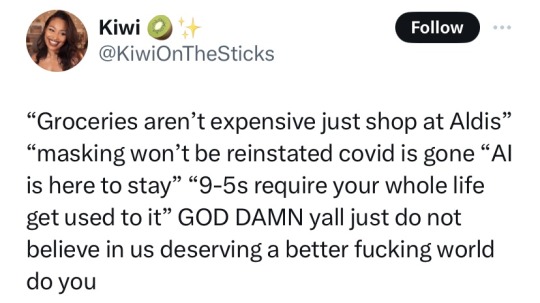
59K notes
·
View notes
Text
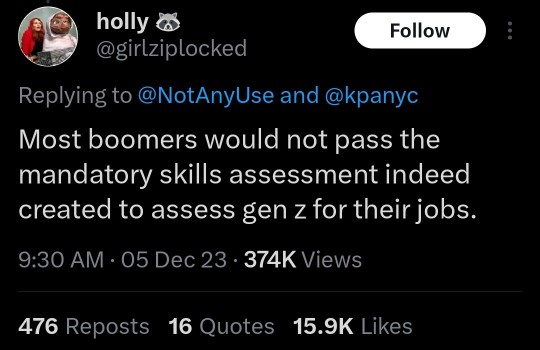

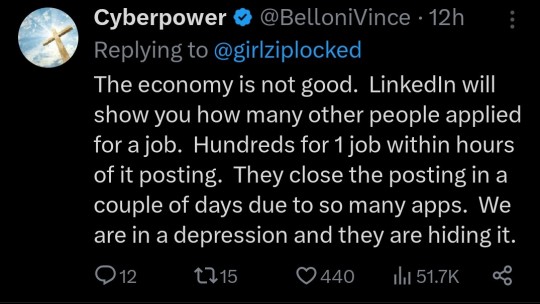

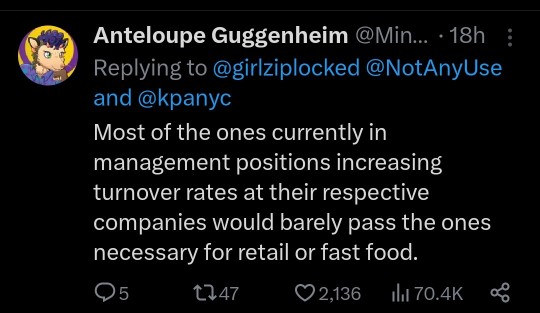
68K notes
·
View notes
Text
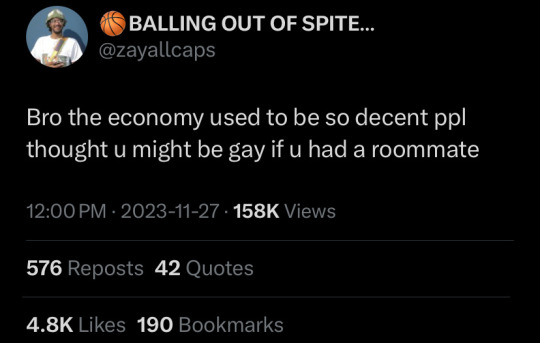
#lgbt#lgbtq#lgbtqia#economics#economy#capitalism#politics#twitter#tweets#tweet#meme#memes#funny#lol#humor
72K notes
·
View notes
Text
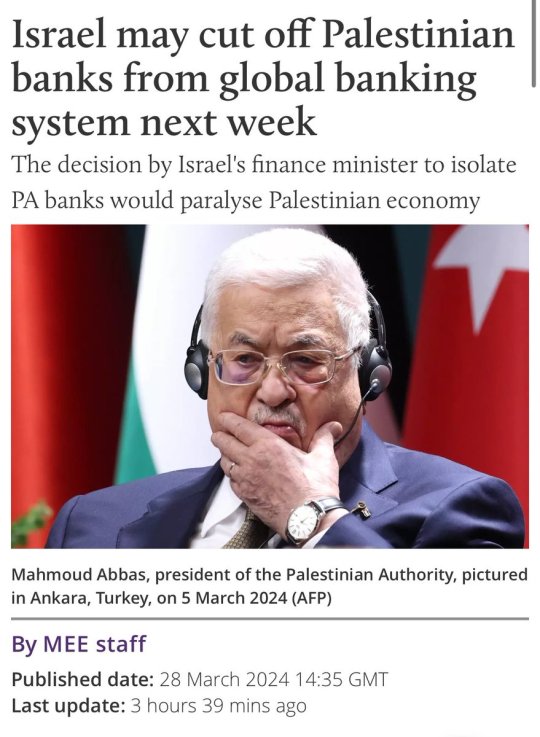
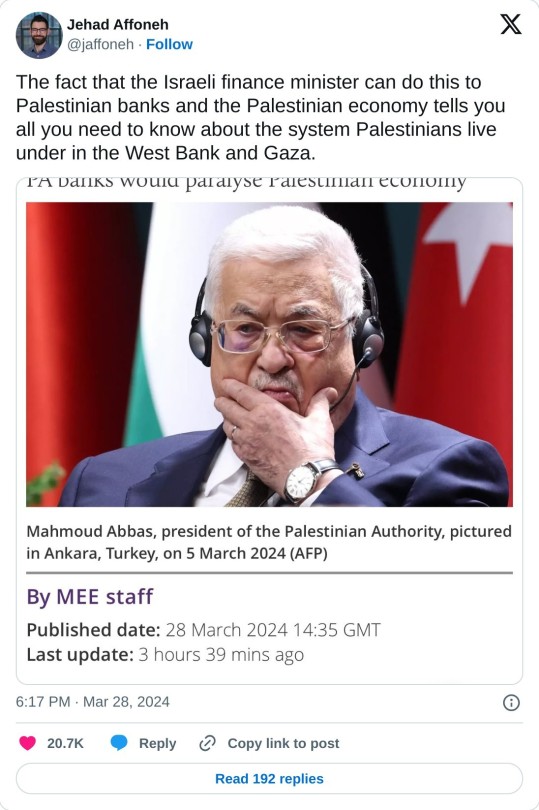
Palestinian banks could be cut off from the Israeli banking system starting next week following a decision by Israel’s finance minister to cease dealings between the two financial institutions, according to a report on Thursday by Israeli newspaper Haaretz.
Israeli Prime Minister Benjamin Netanyahu has two days to convene a cabinet meeting to discuss reversing plans by Finance Minister Bezalel Smotrich to isolate Palestinian banks from both the Israeli and international banking systems.
The Palestinian economy is based on the Israeli currency, the shekel, making it reliant on ties to Israel and its financial dealings with the rest of the world must go through the Bank of Israel and Israeli banks.
We call this Apartheid.
#yemen#jerusalem#tel aviv#current events#palestine#free palestine#gaza#free gaza#news on gaza#palestine news#news update#war news#war on gaza#apartheid#end the occupation#end the apartheid#economy
26K notes
·
View notes
Text
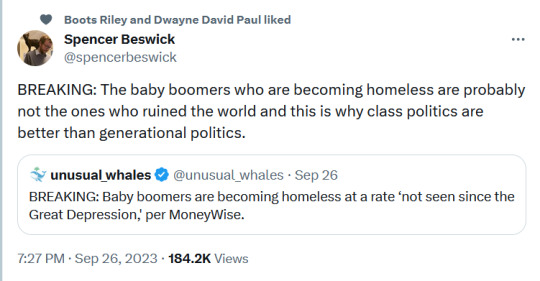
#twitter#tweet#tweets#boomers#economics#economy#homeless#class politics#generational politics#class#inequality#wealth inequality
45K notes
·
View notes
Text

19K notes
·
View notes
Text

#goth#gothic#funny#lol#haha#humor#meme#memes#tweet#twitter#alternative#mental health#introverts#grunge#economy
17K notes
·
View notes
Text
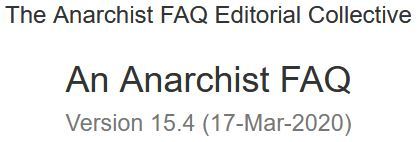
A.3.8 What is “anarchism without adjectives”?
In the words of historian George Richard Esenwein, “anarchism without adjectives” in its broadest sense “referred to an unhyphenated form of anarchism, that is, a doctrine without any qualifying labels such as communist, collectivist, mutualist, or individualist. For others, … [it] was simply understood as an attitude that tolerated the coexistence of different anarchist schools.” [Anarchist Ideology and the Working Class Movement in Spain, 1868–1898, p. 135]
The originator of the expression was Cuban born Fernando Tarrida del Marmol who used it in November, 1889, in Barcelona. He directed his comments towards the communist and collectivist anarchists in Spain who at the time were having an intense debate over the merits of their two theories. “Anarchism without adjectives” was an attempt to show greater tolerance between anarchist tendencies and to be clear that anarchists should not impose a preconceived economic plan on anyone — even in theory. Thus the economic preferences of anarchists should be of “secondary importance” to abolishing capitalism and the state, with free experimentation the one rule of a free society.
Thus the theoretical perspective known as “anarquismo sin adjetives” (“anarchism without adjectives”) was one of the by-products of a intense debate within the movement itself. The roots of the argument can be found in the development of Communist Anarchism after Bakunin’s death in 1876. While not entirely dissimilar to Collectivist Anarchism (as can be seen from James Guillaume’s famous work “On Building the New Social Order” within Bakunin on Anarchism, the collectivists did see their economic system evolving into free communism), Communist Anarchists developed, deepened and enriched Bakunin’s work just as Bakunin had developed, deepened and enriched Proudhon’s. Communist Anarchism was associated with such anarchists as Elisee Reclus, Carlo Cafiero, Errico Malatesta and (most famously) Peter Kropotkin.
Quickly Communist-Anarchist ideas replaced Collectivist Anarchism as the main anarchist tendency in Europe, except in Spain. Here the major issue was not the question of communism (although for Ricardo Mella this played a part) but a question of the modification of strategy and tactics implied by Communist Anarchism. At this time (the 1880s), the Communist Anarchists stressed local (pure) cells of anarchist militants, generally opposed trade unionism (although Kropotkin was not one of these as he saw the importance of militant workers organisations) as well as being somewhat anti-organisation as well. Unsurprisingly, such a change in strategy and tactics came in for a lot of discussion from the Spanish Collectivists who strongly supported working class organisation and struggle.
This conflict soon spread outside of Spain and the discussion found its way into the pages of La Revolte in Paris. This provoked many anarchists to agree with Malatesta’s argument that ”[i]t is not right for us, to say the least, to fall into strife over mere hypotheses.” [quoted by Max Nettlau, A Short History of Anarchism, pp. 198–9] Over time, most anarchists agreed (to use Nettlau’s words) that “we cannot foresee the economic development of the future” [Op. Cit., p. 201] and so started to stress what they had in common (opposition to capitalism and the state) rather than the different visions of how a free society would operate. As time progressed, most Communist-Anarchists saw that ignoring the labour movement ensured that their ideas did not reach the working class while most Collectivist-Anarchists stressed their commitment to communist ideals and their arrival sooner, rather than later, after a revolution. Thus both groups of anarchists could work together as there was “no reason for splitting up into small schools, in our eagerness to overemphasise certain features, subject to variation in time and place, of the society of the future, which is too remote from us to permit us to envision all its adjustments and possible combinations.” Moreover, in a free society “the methods and the individual forms of association and agreements, or the organisation of labour and of social life, will not be uniform and we cannot, at this moment, make and forecasts or determinations concerning them.” [Malatesta, quoted by Nettlau, Op. Cit., p. 173]
Thus, Malatesta continued, ”[e]ven the question as between anarchist-collectivism and anarchist-communism is a matter of qualification, of method and agreement” as the key is that, no matter the system, “a new moral conscience will come into being, which will make the wage system repugnant to men [and women] just as legal slavery and compulsion are now repugnant to them.” If this happens then, “whatever the specific forms of society may turn out to be, the basis of social organisation will be communist.” As long as we “hold to fundamental principles and … do our utmost to instil them in the masses” we need not “quarrel over mere words or trifles but give post-revolutionary society a direction towards justice, equality and liberty.” [quoted by Nettlau, Op. Cit., p. 173 and p. 174]
Similarly, in the United States there was also an intense debate at the same time between Individualist and Communist anarchists. There Benjamin Tucker was arguing that Communist-Anarchists were not anarchists while John Most was saying similar things about Tucker’s ideas. Just as people like Mella and Tarrida put forward the idea of tolerance between anarchist groups, so anarchists like Voltairine de Cleyre “came to label herself simply ‘Anarchist,’ and called like Malatesta for an ‘Anarchism without Adjectives,’ since in the absence of government many different experiments would probably be tried in various localities in order to determine the most appropriate form.” [Peter Marshall, Demanding the Impossible, p. 393] In her own words, a whole range of economic systems would be “advantageously tried in different localities. I would see the instincts and habits of the people express themselves in a free choice in every community; and I am sure that distinct environments would call out distinct adaptations.” [“Anarchism”, Exquisite Rebel, p. 79] Consequently, individualist and communist anarchist “forms of society, as well as many intermediations, would, in the absence of government, be tried in various localities, according to the instincts and material condition of the people … Liberty and experiment alone can determine the best forms of society. Therefore I no longer label myself otherwise than ‘Anarchist’ simply.” [“The Making of An Anarchist”, The Voltairine de Cleyre Reader, pp. 107–8]
These debates had a lasting impact on the anarchist movement, with such noted anarchists as de Cleyre, Malatesta, Nettlau and Reclus adopting the tolerant perspective embodied in the expression “anarchism without adjectives” (see Nettlau’s A Short History of Anarchism, pages 195 to 201 for an excellent summary of this). It is also, we add, the dominant position within the anarchist movement today with most anarchists recognising the right of other tendencies to the name “anarchist” while, obviously, having their own preferences for specific types of anarchist theory and their own arguments why other types are flawed. However, we must stress that the different forms of anarchism (communism, syndicalism, religious etc) are not mutually exclusive and you do not have to support one and hate the others. This tolerance is reflected in the expression “anarchism without adjectives.”
One last point, some “anarcho”-capitalists have attempted to use the tolerance associated with “anarchism without adjectives” to argue that their ideology should be accepted as part of the anarchist movement. After all, they argue, anarchism is just about getting rid of the state, economics is of secondary importance. However, such a use of “anarchism without adjectives” is bogus as it was commonly agreed at the time that the types of economics that were being discussed were anti-capitalist (i.e. socialistic). For Malatesta, for example, there were “anarchists who foresee and propose other solution, other future forms of social organisation” than communist anarchism, but they “desire, just as we do, to destroy political power and private property.” “Let us do away,” he argued, “with all exclusivism of schools of thinking” and let us “come to an understanding on ways and means, and go forwards.” [quoted by Nettlau, Op. Cit., p. 175] In other words, it was agreed that capitalism had to be abolished along with the state and once this was the case free experimentation would develop. Thus the struggle against the state was just one part of a wider struggle to end oppression and exploitation and could not be isolated from these wider aims. As “anarcho”-capitalists do not seek the abolition of capitalism along with the state they are not anarchists and so “anarchism without adjectives” does not apply to the so-called “anarchist” capitalists (see section F on why “anarcho”-capitalism is not anarchist).
This is not to say that after a revolution “anarcho”-capitalist communities would not exist. Far from it. If a group of people wanted to form such a system then they could, just as we would expect a community which supported state socialism or theocracy to live under that regime. Such enclaves of hierarchy would exist simply because it is unlikely that everyone on the planet, or even in a given geographical area, will become anarchists all at the same time. The key thing to remember is that no such system would be anarchist and, consequently, is not “anarchism without adjectives.”
#faq#anarchy faq#revolution#anarchism#daily posts#communism#anti capitalist#anti capitalism#late stage capitalism#organization#grassroots#grass roots#anarchists#libraries#leftism#social issues#economy#economics#climate change#climate crisis#climate#ecology#anarchy works#environmentalism#environment#solarpunk#anti colonialism#mutual aid#cops#police
21 notes
·
View notes
Text
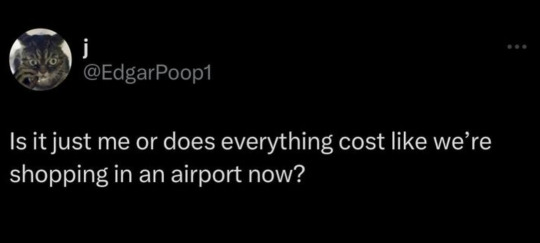
23K notes
·
View notes
Text
I will be homeless in less than 1 hours

I have to stress that my apartment wants me gone. Why you might ask? Because I’m one of the few tenants in the entire apartment complex that pays $1300 for rent meanwhile everyone else pays $1800-$1900. They want me out to the extent they don’t accept any late fees from me, but accepts from other residents. I asked the apartment manager why, she couldn’t give me answer. It’s the norm to have until the 5th of the month to pay rent but not for me.
Goal: $775
CA: $HushEmu
I have to stress I’m not lazy or useless. I had a job despite having multiple disabilities. I’m not asking for a cookie or a pat on the back but its not easy. One small inconvenience really can set you up to be on the streets. Especially if you’re not privileged to have a good paying job with benefits. Like INSURANCE. Or parents that give a crap about you.
In my case the catalyst for this was simply my glasses breaking that snowballed me to eviction. I am legally blind and I have to thank diabetes for that. I cannot see without my glasses so it would be quite literally deadly for me to be on the roads. Ultimately I lost my job from “job abandonment”
I am asking for community support to stay housed. While I make this unfortunate transition. All I have is this community. There are ways beyond financial support that can help me. $1-$2 makes a significant impact
You can:
• Post on my behalf on all your platforms
• Urge your moots with large followings to reblog/retweet my posts
• You can interact fully with my posts to add traction
With the state of the world as it is right now. We need less apathy and more empathy. Please don’t ignore.

#accounting#aesthetic#alternative#black and white#codeblr#clouds#dark academia#bungou stray dogs#design#culture#drawing#gofundme#donate#dragon ball z#economy#the rookie#fantasy#home & lifestyle#misha collins#pokemon#Spotify
2K notes
·
View notes
Text
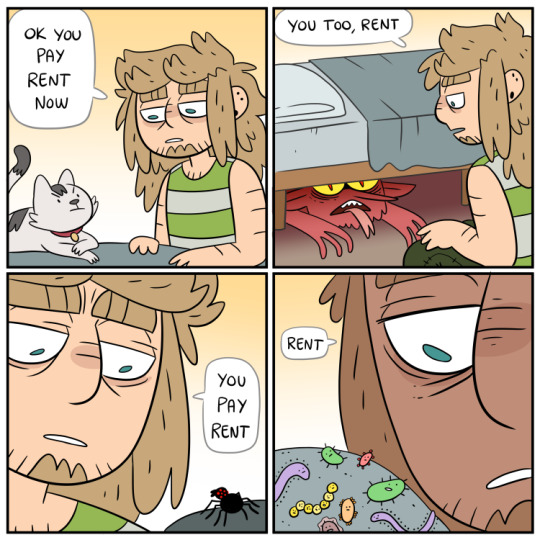
The economy, man.
2K notes
·
View notes
Text
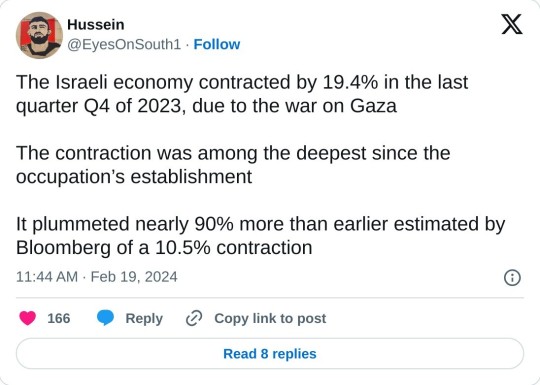
The economy in the fourth quarter was impacted by a 26.9% drop in private spending - the main growth driver - an 18.3% fall in exports and 67.8% slide in investment in fixed assets, especially in residential building.
Government spending, mainly on war expenses and compensating businesses an
#yemen#jerusalem#tel aviv#current events#palestine#free palestine#gaza#free gaza#news on gaza#palestine news#news update#war news#war on gaza#bds movement#economy
8K notes
·
View notes
